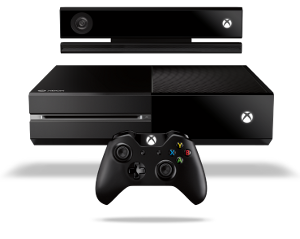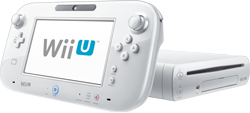- Details
 Haha. Just kidding. There wasn't any Good or Bad in MS's presser today. It was all just Meh.
Haha. Just kidding. There wasn't any Good or Bad in MS's presser today. It was all just Meh.
As I said in “Future of Gaming,” Microsoft seems to think its primary competition is AppleTV and Roku. They spent two-thirds of their one-hour event talking about interactive TV, an exclusive television show with Steven Spielberg's name attached, using Internet Explorer to Bing search while watching live TV[1], etc.
I really don't know what to say about this non-event today. One commenter on a gaming news site said Microsoft “one upped” Sony because MS showed us the actual box.
That's it? That's all you've got? A black brick proves superiority? (It should be noted that, while Sony never showed the box—which probably hadn't been finalized back in February—they did at least actually show people playing games on it. That's way more than MS showed.)
Initial reactions aren't mixed. They're overwhelming that Xbox One is underwhelming. Gamespot's “Twitter Battle” puts PS4 ahead of X1 by 74%. Gamasutra thinks the X1 is “a desperate prayer to stop time.” Kotaku's judgment is the conference was a “disaster.”
The two things that stood out to me the most were these: First, all the cool interactive TV stuff is limited to the US (maybe North America, but nowhere else). MS has long conceded the Japanese market to Nintendo and Sony, apparently it is now conceding the entire world outside of America. Second, they touted a 500GB hard drive. That's just laughable. In today's digital download world (and on a machine that requires every game to be installed to hard drive), 500GB is nothing. That should double (at least) or any purchaser of an X1 had best factor in the cost of a bigger hard drive within the first six months of owning the console.
It's all just a little depressing. I was hoping for something at least as cool as Sony's PS4 reveal. I was hoping for at least a brief demonstration of Illumiroom. I was hoping—albeit against everything we've heard from MS the past three years—there would actually be discussion of games and not just more, “here's how we're integrating even more tightly with ESPN!”
Gamers play games. Is Microsoft even making a game console any more?
[1] Does anyone actually watch live TV any more? And if you do watch live TV, would you spend hundreds of dollars on a game console so you could Skype with your friends while you watched TV?
- Details
This is going to be a long essay, so here's the short version: The Wii U will be the last home console ever made by Nintendo, and the next Xbox could be Microsoft's last console. The home console gaming market is shrinking due to market fragmentation, and, while there's still room for a dedicated home gaming console, there is only room for two, and maybe only one.
Types of Gamers
Throughout the 20th century and into the 21st, we have progressed through several types of media entertainment: radio, film, television, and video games. (The Internet isn't a media itself, just a medium that delivers media in different ways. It will eventually lead to the dissolution of traditional radio and TV stations, but we're still a generation or two from that happening.)
What has marked all those types of media is eventual fragmentation. The video game market is also fragmenting, and it will only get worse (better?) from here. Fragmentation of these markets are based partly on genre (like radio station formats) and also based on market demographics. For video games, more than other media, the market is breaking down by demographic rather than genre.
Broadly there are four types of gamer:
-
Enthusiast. Enthusiasts love to play games, and lots of them. Enthusiasts are more likely to own multiple systems, will almost definitely have at least one console, probably a gaming PC or laptop, and buy lots of games across a variety of genres. These are the so-called “hardcore” or “core” gamers that have been playing for quite some time.
-
Obsessive. Obsessive gamers focus on one or two games and play them to the exclusion of all others. Most often the focus of their obsession is an MMO or similar online game that is constantly updated with new content. Obsessive gamers may change their obsession, but it will be rare, so they don't buy many different games, but they will spend lots of money on their one or two obsessed-over games.
-
Pick-up-and-go. These gamers just want to jump into a game for 15 to 20 minutes and get a quick fix. They don't want big, complicated games or games with long levels or long times between checkpoints. They prefer puzzle games where they can solve a few puzzles and turn the game off.
-
Social. Social gamers like playing with friends. They could be lumped into any of the other groups, and, in terms of spending habits, may fall into one of those groups. However, they will only spend their money and time on games that offer an online component because single-player just isn't interesting to them.
Let's leave that there and take a brief look at the history of consoles, beginning with Nintendo and Sega.
- Details
Three things that were really good about the PS4 reveal:
 1) Sony talked tech. The details weren't very detailed, and they pretty well matched what has been leaked (and a little more detail was published afterward by AMD). What was good to hear was an apology (of sorts) for the Cell processor and architecture of the PS3. Sony has learned its lesson and is building a gaming computer in a box. Albeit an optimized computer with custom firmware.
1) Sony talked tech. The details weren't very detailed, and they pretty well matched what has been leaked (and a little more detail was published afterward by AMD). What was good to hear was an apology (of sorts) for the Cell processor and architecture of the PS3. Sony has learned its lesson and is building a gaming computer in a box. Albeit an optimized computer with custom firmware.
2) Sony focused on games. Nintendo and Microsoft have both bent over backwards to turn their consoles into general-purpose media centers. Sony essentially said to blazes with that, we want PlayStation to be the core of your gaming world. Everything they did and said was about the games. Sony is staking the future of PlayStation on “hardcore” gamers. I think it's a good bet.
3) Announced partnerships (Blizzard!) indicate PS4 will have every meaningful game of the next generation, and some of them will be exclusive. Microsoft could still pull some good games out of their hat, but more and more developers are backing Sony.
- Details
Update: Over a year later, gaming blogs have finally caught on. From Kotaku: "The Wii U feels, increasingly, like a half-step before Nintendo can make a portable machine that can output console-quality graphics when plugged into a TV without needing to be plugged into a wall. In other words, it feels like a prelude to whatever handheld succeeds the Nintendo 3DS XL. It therefore feels like it could be the last machine Nintendo needs to make before it can entertain the idea of converging its handheld and console lines into one."
Welcome to the party, guys.
Original story...
 Nintendo has now announced launch dates and pricing for the Wii U worldwide. Here in the States, the Wii U will hit stores on November 18, 2012 for $300 in a basic package and $350 in a deluxe package. You can pre-order your Wii U from multiple outlets, though, it shouldn't be necessary. Unlike its predecessor, the Wii U is not going to fly off shelves and you should be able to get a lower price if you can wait past Christmas
Nintendo has now announced launch dates and pricing for the Wii U worldwide. Here in the States, the Wii U will hit stores on November 18, 2012 for $300 in a basic package and $350 in a deluxe package. You can pre-order your Wii U from multiple outlets, though, it shouldn't be necessary. Unlike its predecessor, the Wii U is not going to fly off shelves and you should be able to get a lower price if you can wait past Christmas
The Wii U is, unfortunately, a product of panic. You would not think Nintendo a company to panic, but that is exactly what they are doing. It is also the product of a company that has lost its way when it comes to innovation. The Wii U is not innovative, it is reactive, and, worse, it is reactive to problems that do not exist and uses technology that doesn't solve those problems even if they DID exist.
Nintendo has repeated—ad nauseum—the basic design impetus for the much-hyped Gamepad—a tablet-like controller for the Wii U...People living in your house should not have to fight over the TV. Having the second screen means one (or more) people can keep playing on the Gamepad while someone else watches TV.
Do people at Nintendo live in their offices? Have any of them been in a house any time in the last decade? Most families have MULTIPLE entertainment options in their house. The average American home has 2.5 kids and 3 televisions. Then there are computers, portable games systems, etc. There are five people living under my roof and at least two entertainment options per person. There IS NO NEED for that function of the Gamepad.
- Details
There's been a lot of chatter on the Freeh report about the conspiracy of silence at Penn State, especially as regards Joe Paterno's role in covering up Jerry Sandusky's actions over the past 14 years. A lot of talking heads are calling for PSU to receive the "death penalty"--being forced by the NCAA to drop football. I think that's too harsh because it punishes the current PSU players for something they had no role in. It also doesn't hurt those who were directly involved. Three of those, the past president, vice president, and athletic director will probably face prison time for their silence and their lies to the grand jury. Paterno, however, is forever beyond any earthly justice.
Paterno's legacy, though, is not beyond the "justice" of society. Right now, Paterno is the winningest coach in NCAA history. That is a black mark on the NCAA's record books. The solution, then, is simple. Vacate Penn State's wins since 1998. Current PSU players are not adversely affected. PSU continues to play football (which helps fund the university's other programs). And Joe Paterno is no longer listed in the record books, which is fitting because of the monstrous ring of secrecy he led.
- Details
Forgive me while I talk about a real life game for a bit, rather than video games.
"The NCAA was founded in 1906 to protect young people from the dangerous and exploitive athletics practices of the time.
The rugged nature of early-day football, typified by mass formations and gang tackling, resulted in numerous injuries and deaths and prompted many college and universities to discontinue the sport. In many places, college football was run by student groups that often hired players and allowed them to compete as non-students. Common sentiment among the public was that college football should be reformed or abolished.
President Theodore Roosevelt summoned college athletics leaders to two White House conferences to encourage reforms. In early December 1905, Chancellor Henry M. MacCracken of New York University convened a meeting of 13 institutions to initiate changes in football playing rules. At a subsequent meeting December 28 in New York City, 62 colleges and universities became charter members of the Intercollegiate Athletic Association of the United States (IAAUS)."
The above is from the official history of the NCAA as posted on their Web site[1].
A little over 100 years ago, American football was so dangerous, the President of the United States stepped in and made those in charge adopt new rules to protect player safety. In the wake of the New Orleans Saints Bounty Scandal[2], many talking-head ex-football players keep telling us non-football-playing folks we "just don't get it." This is the culture of the NFL, they say. Defensive players are coached to take out the other team's star players. Adding a little money to sweeten the pot may sound thuggish, but it isn't really needed. Defensive players are all just head-hunters anyway and we should accept it as a part of football.
Well, let's read between the lines, shall we?
Page 9 of 12



